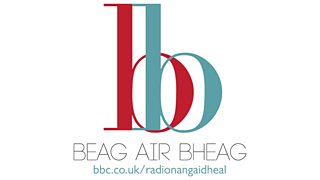Oisean a’ Ghrà mair Sreath 10: 9
Criomag: Dòmhnall Ruadh (‘Leugh Mi’)

sean, NAS SINE | ‘old, OLDER’: cruthan coimeasach a’ bhuadhair | comparative forms of the adjective
Dòmhnall:
“Tha mi a’ smaoineachadh mar as sine a tha mi a’ fàs gur ann as motha a tha mi a’ taghadh rud ris an can iad non-fiction.”
“I think the older I ‘m getting, the more I’m choosing what they call non-fiction.”
Mar as sine... ’sann as motha... ‘the older..., the more...’
Mar as motha, ’s ann as fhèarr. ‘The more the merrier, the bigger the better.’
mòr (‘big, great’) → motha
nas motha (‘bigger, more’), as motha (‘biggest, most’)
Dh’ith a’ chlann a’ chuid as motha dheth. ‘The children ate the biggest portion of it, the most of it.’
Tha am flat ùr agam nas motha na an t-seann fhear. ‘My new flat is bigger than the old one.’
(Cuideachd - ‘neither, either’: nas motha.
Chan eil mise air guth a chluinntinn nas motha. ‘I haven’t heard anything either.’)
beag (‘little, small’) → bige / lugha
nas bige / lugha (smaller), as bige / lugha (smallest)
Tha an taigh ùr aca gu math nas lugha / nas bige. ‘Their new house is much smaller.’
’S i as bige / as lugha san sgioba. ‘She’s the smallest in the team.’
(Cuideachd - ‘unless’: nas lugha na (gun).
Feumaidh nach eil i a-staigh — nas lugha na gun do thuit i na cadal? ‘She musn’t be in — unless she’s fallen asleep?’)
sean (‘old’) → sine
nas sine (‘older’), as sine (‘oldest’)
Se seo an togalach as sine sa bhaile. ‘This is the oldest building in the town.’
Tha thusa nas sine na mi, nach eil? ‘You’re older than me, aren’t you?’
òg (‘young’) → òige
nas òige (‘younger’), as òige (‘youngest’)
Tha sinne gu math nas òige na iadsan. ‘We’re much younger than them.’
teth (‘hot’) → teotha
nas teotha (hotter), as teotha (hottest)
Seo an samhradh as teotha a tha air a bhith againn o chionn fhada. ‘This is the hottest summer we’ve had in a long time.’
tiugh (‘thick’) → tighe
nas tighe (thicker), as tighe (thickest).
Thoir dhomh am maide as tighe. ‘Pass me the thickest piece of wood, the thickest stick.’
doirbh (‘difficult’) → dorra
nas dorra (‘thicker’), as dorra (‘thickest’)
Tha an deuchainn am-bliadhna gu math nas dorra na an àbhaist. ‘This year’s exam is much more difficult than usual.’
duilich (‘difficult’) → duilghe
nas duilghe (‘more difficult, harder’), as duilghe (‘most difficult, hardest’)
Tha an geama seo fada nas duilghe na bha mi an dùil. ‘This game’s far more difficult (much harder) than I expected.’
blàth (‘warm’) → blàithe
nas blàithe (‘warmer’), as blàithe (‘warmest’)
Bidh i nas blàithe feasgar. ‘It’ll be warmer in the afternoon.’
tràth (‘early’) → tràithe
nas tràithe (‘earlier’), as tràithe (‘earliest’)
Chuala sinn Dòmhnall Ruadh a’ bruidhinn nas tràithe air a’ phrògram. ‘We heard D. R. speaking earlier in the programme.’
F → FH :
fada → fhaide
fuar → fhuaire
furasta → fhasa
fileanta → fhileanta
Sin an dòigh as fhasa. ‘That’s the easiest way.’
Tha a’ cheist seo nas fhasa na bha mi an dùil. ‘This question is easier than I expected.’
Feumaidh sinn nas fhaide. ‘We need longer.’
Tha i nas fhuaire na bha i an-dè. ‘It’s colder than it was yesterday.’
Mar as motha a chleachdas tu do chuid Gàidhlig ’s ann as fhileanta a bhios tu a’ fàs.
‘The more you use your Gaelic, the more fluent you’ll become.’

